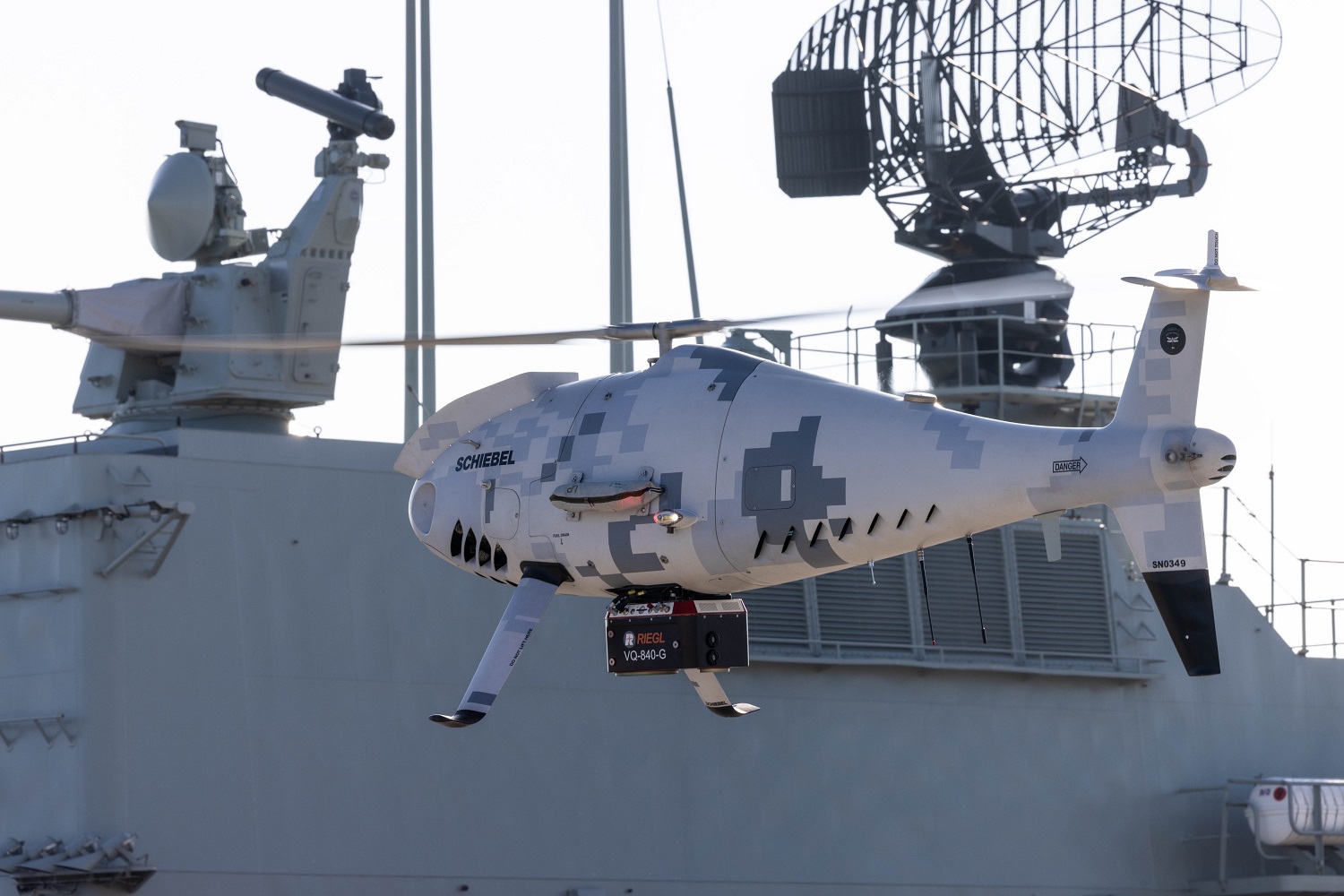Schiebel participated in REPMUS (Robotic Experimentation and Prototyping using Maritime Uncrewed Systems) and Dynamic Messenger 2023, in Portugal. Together with several partners, Schiebel conducted flights with the CAMCOPTER® S-100, showcasing its Anti-Submarine Warfare (ASW) sonobuoy deployment solution, bathymetric scanning for Rapid Environmental Assessment (REA) and Mine Counter Measures (MCM) as well as Autonomous Underwater Vehicle (AUV) and profiling float deployment. Unmanned solutions for ASW, MCM, REA and Maritime Security Operations (MSO) are becoming increasingly relevant and applicable in today’s naval defence. At the month-long large-scale NATO exercise, Schiebel demonstrated its multi-mission capability with a selection of different sensors and payloads, reconfiguring the CAMCOPTER® S-100 between missions to conduct a variety of operations.
At last year’s REPMUS, Schiebel, together with Thales, demonstrated the relaying of data from sonobuoys. This year, the S-100 impressed with its sonobuoy dispenser, successfully deploying NATO-standard G-size sonobuoys. The combination of both these capabilities enables the Schiebel Unmanned Air System (UAS) to offer an endto-end solution for ASW. In the field of MCM, the CAMCOPTER® S-100 successfully demonstrated the VQ-840-G LiDAR from the Austrian company RIEGL working with Thales. Through the open architecture of the Thales MCM Mission Management System (M-CUBE), which enables rapid and flexible third-party sensor integration, the CAMCOPTER® S-100 was able to perform a complete airborne MCM mine hunting capability, achieving 100% detection of all mine targets.
“Being NATO exercises, REPMUS and Dynamic Messenger are exceptional playgrounds to demonstrate our innovative capabilities. The S-100 once again proved to be a vital unmanned asset in supporting the latest maritime defence solutions, such as ASW and MCM – offering highly sought after capabilities”, said Hans Georg Schiebel, Chairman of the Schiebel Group.

Schiebel also showcased its role in supporting advanced REA missions, using the S-100’s proven cargo hook to deploy the Yuco AUV from the French company Seaber, as well as the APEX profiling float from Teledyne, producing a opobathymetric situational picture. The Fugro Rapid Airborne Multibeam Mapping System (RAMMS) from the U.S. company Areté contributed to the topobathymetric product, specifically closing the surf zone gap, which cannot be safely accessed by surface assets. Unmanned-Unmanned Teaming (U-UT) was presented at the NATO exercise with the S-100 relaying data from ALSEAMAR’s SEAEXPLORER glider to a Combat Management System (CMS), validating the capability of the underwater vehicle to operate in a satellite-denied environment. Schiebel’s partners included Areté, Thales, Seaber (Yuco), Teledyne (APEX), ALSEAMAR (SEAEXPLORER), RIEGL and Fugro. The S-100’s involvement in the exercises was sponsored by both the UK Royal Navy and the U.S. Office of Naval Research. REPMUS and Dynamic Messenger were hosted by the Portuguese Navy.
Schiebel’s CAMCOPTER® S-100 Unmanned Air System (UAS) is an operationally proven capability for military and civilian applications. The Vertical Takeoff and Landing (VTOL) UAS requires no prepared area or supporting equipment to enable launch and recovery. It operates by day and by night, under adverse weather conditions, with a beyond line-of-sight capability out to 200 km / 108 nm, over land and sea. Its carbon fiber and titanium fuselage provides capacity for a wide range of payload/endurance combinations up to a service ceiling of 5,500 m / 18,000 ft. In a typical configuration, the CAMCOPTER® S-100 carries a 34-kg / 75-lbs payload up to 10 hours and is powered with AVGas or JP-5 heavy fuel. High-definition payload imagery is transmitted to the control station in real time. In addition to its standard GPS waypoint or manual navigation, the S-100 can successfully operate in environments where GPS is not available, with missions planned and controlled via a simple point-andclick graphical user interface. The high-tech unmanned helicopter is backed by Schiebel’s excellent customer support and training services.
Founded in 1951 in Vienna, the globally operating Schiebel Group focuses on the development, design and production of the revolutionary CAMCOPTER® S-100 Unmanned Air System (UAS). Certified to meet AS/EN 9100 standards, Schiebel has built an international reputation for producing high-tech military, commercial and humanitarian products, which are backed by exceptional after-sales service and support. Schiebel has facilities in Vienna and Wiener Neustadt (Austria), Manassas, VA (USA), Abu Dhabi (UAE), and Shoalhaven (Australia).















